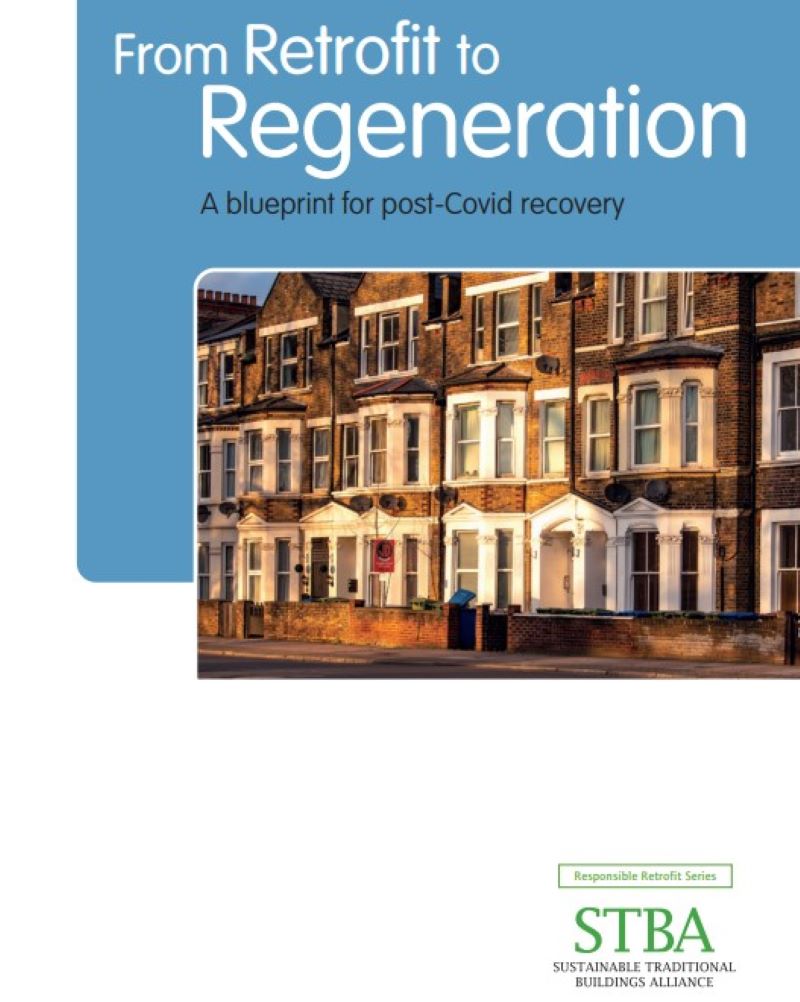STBA report to provide blueprint for post-COVID recovery

|
A report from the Sustainable Traditional Building Alliance (STBA) says a well-thought-out programme of regeneration would enable the Government to present a post-COVID recovery which delivers all the objectives of health, heritage, community cohesion, local employment, cleaning and re-greening the environment, transport, and flood alleviation. The report is available from the STBA website.
Entitled 'From Retrofit to Regeneration: A blueprint for a post-COVID recovery', the report says, "Regeneration has to be planned and delivered (principally) at a community level, as many of these benefits can only be realised through co-operation and joined-up thinking, which should in turn inform the funding mechanisms."
The findings show that, "During the pandemic there has been a genuine appetite among many people to see a fundamental change in how we live, how we share resources and space. There has also been a sudden and huge interest in welfare economics (as opposed to GDP)."
The report's author Nigel Griffiths, says, "This paper explains why and how we got it wrong in the past, sets out the broader regeneration approach and provides a template to embed genuine sustainability into our forward planning for the built environment."
The STBA says it is calling on central government to establish a Department for Sustainability (transferring Energy, Housing and Communities to this new body) and a resetting of societal priorities away from consumerism and economic aims and towards wellbeing. It is urging local authorities to:
- Form an agenda that is considered in future planning.
- Re-assess existing development planning to minimise or eliminate green field development.
- Convert redundant commercial sites to residential use, community use.
STBA also recommends social, private housing landlords and housing developers to look again at their regeneration agenda and shift operations accordingly.
CIAT is a supporting organisation of STBA, and Professor Sam Allwinkle PPBIAT FCIAT is STBA Industry Chair.
This article originally appeared on the CIAT website. It was published on 20 December 2021.
--CIAT
[edit] Related articles on Designing Buildings
- Areas for regeneration.
- CIAT articles.
- Coronavirus and the construction industry.
- Government departments responsibility for construction.
- Local planning authority.
- Planning4People.
- Regeneration.
[edit] External resources
Featured articles and news
Scottish parents prioritise construction and apprenticeships
CIOB data released for Scottish Apprenticeship Week shows construction as top potential career path.
From a Green to a White Paper and the proposal of a General Safety Requirement for construction products.
Creativity, conservation and craft at Barley Studio. Book review.
The challenge as PFI agreements come to an end
How construction deals with inherited assets built under long-term contracts.
Skills plan for engineering and building services
Comprehensive industry report highlights persistent skills challenges across the sector.
Choosing the right design team for a D&B Contract
An architect explains the nature and needs of working within this common procurement route.
Statement from the Interim Chief Construction Advisor
Thouria Istephan; Architect and inquiry panel member outlines ongoing work, priorities and next steps.
The 2025 draft NPPF in brief with indicative responses
Local verses National and suitable verses sustainable: Consultation open for just over one week.
Increased vigilance on VAT Domestic Reverse Charge
HMRC bearing down with increasing force on construction consultant says.
Call for greater recognition of professional standards
Chartered bodies representing more than 1.5 million individuals have written to the UK Government.
Cutting carbon, cost and risk in estate management
Lessons from Cardiff Met’s “Halve the Half” initiative.
Inspiring the next generation to fulfil an electrified future
Technical Manager at ECA on the importance of engagement between industry and education.
Repairing historic stone and slate roofs
The need for a code of practice and technical advice note.
Environmental compliance; a checklist for 2026
Legislative changes, policy shifts, phased rollouts, and compliance updates to be aware of.




















